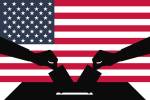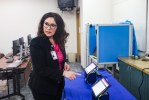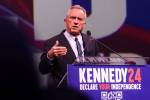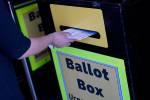Voter ID is actually quite popular
You’re going to hear a lot about voter identification this year. A lot of what you’ll hear isn’t true.
Election integrity will be a defining issue in this year’s secretary of state race between state Sen. Barbara Cegavske, R-Las Vegas, and Democratic Treasurer Kate Marshall. But Sharron Angle, the former GOP assemblywoman and U.S. Senate candidate who mobilizes liberal forces better than any Democrat, has made Nevada a new battleground for voter ID. Angle has filed an initiative to place within the Nevada Constitution a requirement that voters must furnish government-issued photo identification before being allowed to vote.
Angle must collect signatures from more than 101,000 registered voters by June 17 to qualify the initiative for November’s ballot. Even if Angle stays out of her own way and assembles the resources and people necessary to complete such a substantial task — which is no guarantee, based on her past failures with initiatives — she’ll have to successfully defend the petition in court against challenge after challenge. The first lawsuit has already been filed.
And the agitations against the initiative are well underway. Angle has given Democrats, who lack a top-of-the-ticket candidate to inspire the base and drive turnout, a cause to rally behind. If the petition qualifies, it will attract outside money for ad buys and have the potential to affect races up and down the ballot. The fundraising pitches are familiar: Republicans are trying to take away your right to vote! Voter suppression law proposed by GOP extremists! The poor and minorities will be disenfranchised!
But this is not some new, fringe idea. This is not a partisan, racist wedge issue.
Poll after poll shows a clear majority of participants are concerned enough about the integrity of elections to support a photo identification requirement. A 2013 Marist/McClatchy poll found 83 percent of Americans — including 72 percent of Democrats, 83 percent of nonwhite adults and 84 percent of households earning less than $50,000 per year — said requiring people to show ID in order to vote was “a good thing,” while just 13 percent said such a mandate was “a bad thing.” A 2012 Washington Post poll found 74 percent of Americans in favor of a photo ID requirement for voters.
Besides, it’s already law in a dozen states, according to the National Conference of State Legislatures (with more on the way), and strict voter photo ID requirements have been upheld as constitutional by the U.S. Supreme Court. The 2008 ruling that validated Indiana’s toughest-in-the-nation photo ID law was 6-3, with an opinion in favor written by liberal lion John Paul Stevens. The law “is amply justified by the valid interest in protecting ‘the integrity and reliability of the electoral process.’ … We cannot conclude that the statute imposes ‘excessively burdensome requirements’ on any class of voters,” he wrote.
The laws of Indiana and other states — as with Angle’s proposal — require the government to provide photo identification free of charge to those who can’t afford it. Considering Americans need photo identification for such routine matters as using a credit card, cashing or writing a check, boarding an airplane and applying for public benefits, the idea that presenting photo identification to vote is hardship is folly.
So is the argument that photo ID laws lead to widespread suppression. After Indiana and Georgia enacted their laws, the states registered two of the country’s largest turnout increases in 2008, driven by substantial growth in Democratic and minority turnout. If any state’s photo ID requirements had caused statistically significant decreases in turnout, Eric Holder’s Justice Department would be all over them.
Another popular attack on voter ID laws says they’re a solution in search of a problem, that there is no evidence of election fraud and that such claims are falsely deployed to mask more sinister motives. Anyone who has read “Who’s Counting?: How Fraudsters and Bureaucrats Put Your Vote at Risk,” by John Fund and Hans von Spakovsky, knows otherwise. Democratic Sen. Al Franken won election in Minnesota in a 2008 lawyer-driven recount by 312 votes, becoming the 60th Democratic vote for Obamacare. The authors document how 1,099 identified felons cast ballots in Minnesota that year despite being ineligible to vote, leading to nearly 200 election fraud convictions through 2012. The book also reports on voting by the dead and illegal immigrants.
Many states, including Nevada, do not require photo identification to register to vote. You never have to prove you’re a citizen to vote. And laws that protect voters from intimidation at the polls, not to mention the presence of party poll watchers, make challenging any voter’s ballot impossible and potentially criminal. Our elections are exceptionally vulnerable to mischief because voting is essentially an honors system — people can now register to vote online as long as they promise they’re eligible to cast ballots.
Voters see how easy it is to game the system every time they visit their precinct. They want confidence that their vote isn’t being canceled out by an ineligible ballot. That’s why they support additional security measures such as a photo identification requirement.
The surest sign that requiring voters to produce photo identification has bipartisan support: Nevada’s current secretary of state, Democrat Ross Miller, proposed a photo ID mandate last year. The Democrat-controlled Legislature rejected it. If Miller, who is running for attorney general this year and is thought to have gubernatorial ambitions, thought voter ID was a political loser, he wouldn’t have gone there.
Is Angle pursuing this initiative for purely policy-based reasons? Of course not. She has political reasons, to be sure.
Whatever her motivations, the merits of voter photo identification have wide appeal. Access to the ballot box is a right. Denying access threatens the credibility of elections, but so does providing easy access that invites fraud. How can Americans have confidence in the integrity of their governments if they don’t have faith in the integrity of their elections?
Glenn Cook (gcook@reviewjournal.com) is the Las Vegas Review-Journal’s senior editorial writer. Follow him on Twitter: @Glenn_CookNV. Listen to him Mondays at 4 p.m. on “Live and Local with Kevin Wall” on KXNT News Radio, 100.5 FM, 840 AM.
















